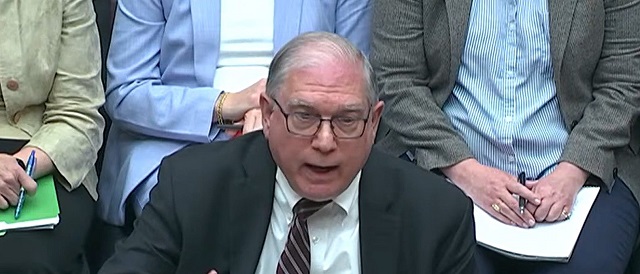Opinion
Overnight sensation known as Oliver Anthony says “I’m not a good musician, I’m not a very good person” as he turns down multi million dollar offer

His real name is Christopher Lunsford. Friends and family just call him Chris. But over the last week or so, millions of people around the world have been introduced to him as Oliver Anthony. That’s because Chris records music under the name of his grandfather, Oliver Anthony, for a youtube channel called RadioWv (Radio West Virginia). Back on August 8, Chris was creating music as a hobby he practiced after work and on days off. But on August 9, a video he recorded for his original song “Rich Men North of Richmond” was loaded on the RadioWv channel. Within hours, Lunsford’s life was turned upside-down.
Chris Lunsford and “Draven” from RadioWv were sure this was a special song and they were hoping maybe something this good could get a few hundred thousands views. Well… 21 million views later, Lunsford has reportedly had to contend with about 50,000 online comments, and consider an 8 million dollar recording contract. Something about this song has touched a nerve.
In case you haven’t heard it yet, here it is on the youtube channel RadioWv. And this is the description put up by RadioWv.
“When I first came across Oliver Anthony and his music, I was blown away to say the least. He had a whole collection of songs that I could listen to for hours. Oliver resides in Farmville, VA with his 3 dogs and a plot of land he plans on turning into a small farm to raise livestock. We have a whole mess of songs set to release of Oliver for your viewing and listening pleasure, he is truly special and notes his biggest influence as Hank Williams Jr. Oliver wants to give hope to the working class and your average hard working young man who may have lost hope in the grind of trying to get by.”
The song is written about the struggles of regular folk in Appalachia, but millions of Americans have adopted it as an anthem for their own lives. The secret sauce behind the success of “Rich Men North of Richmond” certainly has to do with a brilliant title and the haunting melody. But it’s the heartfelt lyrics that strongly challenge political and corporate power structures which seem to be taking the world by storm. It’s kicking up a little storm of controversy too. While many media outlets are calling the song a ‘conservative anthem’, the BBC goes as far as to say the song is “the latest in a series of cultural flashpoints that reflect a deeply divided America.“
As a songwriter, Lunsford has called on a bitter period in his life to come up with lines like these:
“Livin’ in the new world/ With an old soul/
These rich men north of Richmond/ Lord knows they all just wanna have total control/
Wanna know what you think, wanna know what you do/ And they don’t think you know, but I know that you do/
‘Cause your dollar ain’t s**t and it’s taxed to no end/ ‘Cause of rich men north of Richmond.”
Like it or hate it, the song has rocketed to the top of Country Music charts. For his part Christopher Lunsford has made two public statements which are no where near as political as his lyrics. Lunsford recorded the first statement as an update to his sudden success.
Then with the pressure building to address his new audience again, Thursday, Chris Lunsford wrote this thoughtful update on his Oliver Anthony facebook page.
From the Facebook page of Oliver Anthony Music
It will be interesting to see what happens to Chris Lunsford. Certainly at some point soon he’ll accept a contract to make enough money to live a comfortable life far removed from the struggling Appalachian behind “Rich Men North of Richmond”. Millions of new fans affected by his song will hope he never moves too far away.
COVID-19
House COVID Committee Confirms What We Have Long Suspected — The Feds Really Hate Transparency

 From the Daily Caller News Foundation
From the Daily Caller News Foundation
Last week details emerged from the House Select Subcommittee on the Coronavirus Pandemic, confirming what government transparency advocates long suspected: Federal bureaucrats are purposefully stonewalling the American people’s right to know about their government.
Republican Kentucky Rep. James Comer, who chairs the full House Oversight and Accountability Committee, read from an email that Dr. David Morens, a top aide to Dr. Anthony Fauci, sent claiming that a staffer inside the National Institutes of Health (NIH) had shown him how to erase records requested by the public.
He was corresponding with Peter Daszak, president of EcoHealth Alliance, the organization that used tax dollars to fund controversial gain-of-function research in Wuhan, where the COVID outbreak began. The Department of Health and Human Services has since suspended funding of EcoHealth Alliance.
Morens wrote: “I learned from our FOIA (Freedom of Information Act) lady here how to make emails disappear after I am FOIA’d, but before the search starts. So, I think we are all safe. Plus, I deleted most of those earlier emails after sending them to Gmail.”
The implications for government transparency are enormous. How often do NIH staffers conceal what they do with our tax dollars? Why did a FOIA officer feel empowered to assist subjects of FOIA requests? How else do FOIA offers interfere with these requests? Has this behavior spread to the Centers for Disease Control and other agencies?
Our auditors at OpenTheBooks.com can speak to the problem. We have spent years — and gone to court — to force NIH to reveal the royalties paid to government scientists through medical innovation licensing.
When Americans are considering a drug or therapeutic recommended by public health officials, they deserve to understand all the financial stakes at play. Were any decision makers receiving payments? Were they continuing more lucrative research at the expense of other public health solutions?
For many, the question looming largest has been whether the relentless COVID vaccine push was driven by a potential windfall for NIH and certain scientists there.
When we first filed a FOIA, the agency ignored us and then refused to release the information.
After suing, NIH was required to release the information and began doing so incrementally due to the high volume of data. Tallied from 2009 through 2020, it amounted to an enormous sum–over $325 million paid by private companies to NIH and its scientists over 56,000 transactions.
Previously, we’d also discovered that Dr. Fauci, the face of the nation’s COVID response, was the highest compensated bureaucrat in the country. He out-earned President Biden. He out-earned his own boss, then-Acting NIH Director Lawrence Tabak.
Along with Fauci, who scoffed at concerns about royalty payments, Tabak faced questions from Congress.
In a March 2023 budget hearing, Rep. John Moolenaar told Tabak an obvious truth: every single, secret royalty payment represents a potential conflict of interest.
“To me, one of the biggest concerns people had during this last couple years is: Were they getting truthful information from their government? Could they trust what people were saying about the medicines? To me, that creates a very disturbing appearance.”
“The idea that people were getting a financial benefit from certain research that was done and grants that were awarded, that to me is the height of the appearance of a conflict of interest,” Moolenaar concluded.
The lawmaker urged NIH to make the money trail more transparent.
It was Tabak in the hot seat again last week, as Comer recited Morens’ outrageous email message.
Was the behavior he described consistent with NIH policy, Comer asked? “It is not,” Tabak responded flatly.
Did the FOIA team at NIH help its colleagues avoid transparency? “I certainly hope not,” Tabak offered.
Hope doesn’t suffice in this situation. It demands that lawmakers strengthen transparency law, update it for the 21st century and create some consequences for bad actors.
There are a few primary ways bureaucrats and decisionmakers violate the spirit of the law.
First, they overuse a series of exemptions designed to protect national security secrets or privacy laws. Too much is omitted through these exceptions; the American people deserve the full truth.
When documents are produced, they’re too often rendered useless through excessive redactions. We’re still fighting in real time to get more pieces of the royalty puzzle revealed.
Next, unreasonable delays are blamed on staffing levels, while many FOIA-related roles sit open. Agencies must prioritize filling those seats and Congress should appropriate more of them as needed.
Finally, we have the behavior Morens describes. A post facto effort to simply abscond with the information. It’s not just a policy violation but an affront to the spirit of the Freedom of Information Act. What consequences do these staffers ever truly face?
Until we get serious about protecting transparency, “FOIA lady” will be a duly anonymous symbol of what many have suspected: government employees hustling to cover their tracks.
Adam Andrzejewski is founder & CEO of OpenTheBooks.com, the nation’s largest private database of public spending.
Business
Government red tape strangling Canada’s economy

From the Fraser Institute
The cost of regulation from all three levels of government to Canadian businesses totalled $38.8 billion in 2020, for a total of 731 million hours—the equivalent of nearly 375,000 fulltime jobs.
One does not have to look too deeply into recent headlines to see that Canada’s economic conditions are declining and consequently eroding the prosperity and living standards of Canadians. Between 2000 and 2023, Canada’s per-person GDP (a key indicator of living standards) has lagged far behind its peer countries. Business investment is also lagging, as are unemployment rates across the country particularly compared to the United States.
There are many reasons for Canada’s dismal economic conditions—including layer upon layer of regulation. Indeed, Canada’s regulatory load is substantial and growing. Between 2009 and 2018, the number of regulations in Canada grew from about 66,000 to 72,000. These regulations restrict business activity, impose costs on firms and reduce economic productivity.
According to a recent “red tape” study published by the Canadian Federation of Independent Business (CFIB), the cost of regulation from all three levels of government to Canadian businesses totalled $38.8 billion in 2020, for a total of 731 million hours—the equivalent of nearly 375,000 fulltime jobs. If we apply a $16.65 per-hour cost (the federal minimum wage in Canada for 2023), $12.2 billion annually is lost to regulatory compliance.
Of course, Canada’s smallest businesses bear a disproportionately high burden of the cost, paying up to five times more for regulatory compliance per-employee than larger businesses. The smallest businesses pay $7,023 per employee annually to comply with government regulation while larger businesses pay a much lower $1,237 per employee for regulatory compliance.
And the Trudeau government has embarked on a massive regulatory spree over the last decade, enacting dozens of major regulatory initiatives including Bill C-69 (which tightens Canada’s environmental assessment process for major infrastructure projects), Bill C-48 (which restricts oil tankers off Canada’s west coast) and electric vehicle mandates (which require all new cars be electric by 2035). Other examples of government red tape include appliance standards to reduce energy consumption from household appliances, home efficiency standards to reduce household energy consumption, banning single-use plastic products, “net zero” nitrous oxide emissions regulation, “net zero” building emissions regulations, and clean electricity standards to drive net emissions of greenhouse gases in electricity production to “net zero” by 2035.
Clearly, Canada’s festooning pile of regulatory red tape is badly in need of weeding. And it can be done. For example, during a deregulatory effort in British Columbia, which appointed a minister of deregulation in 2001, there was a 37 per cent reduction in regulatory requirements in the province by 2004.
Rather with plowing ahead with an ever-growing pallet of regulations to be heaped upon Canadian businesses and citizens, government should reach for the garden shears and start reducing the most recent regulatory expansions (before they have time to do too much harm), and then scour the massive strangling forest of older regulations.
Whacking through the red tape would go a long way to help Canada’s economy out of its dismal state and back into competitive ranges with its fellow developed countries and our neighbours in the U.S.
Author:
-

 International2 days ago
International2 days agoFormer GOP Republican Presidential Candidate Buys Activist Stake In Left-Wing Outlet
-

 Energy1 day ago
Energy1 day agoFossil fuels not going away anytime soon
-

 COVID-192 days ago
COVID-192 days agoSaskatchewan appeals court upholds COVID-era gov’t restrictions on outdoor gatherings
-

 International1 day ago
International1 day agoBiden DOJ authorized FBI to use ‘deadly force’ if needed during raid of Trump’s Mar-a-Lago estate
-

 Agriculture17 hours ago
Agriculture17 hours agoThe China – Russia “Grain Entente” – what is at stake for Canada and its allies?
-

 COVID-192 days ago
COVID-192 days agoBiden’s Navy secretary says he has ‘no regrets’ about firing 5,000+ unvaxxed sailors, Marines
-

 International2 days ago
International2 days agoNew bill would have exposed alleged conflicts in Biden, Trump presidencies
-

 Automotive1 day ago
Automotive1 day agoEV transition stalls despite government mandates and billion-dollar handouts







